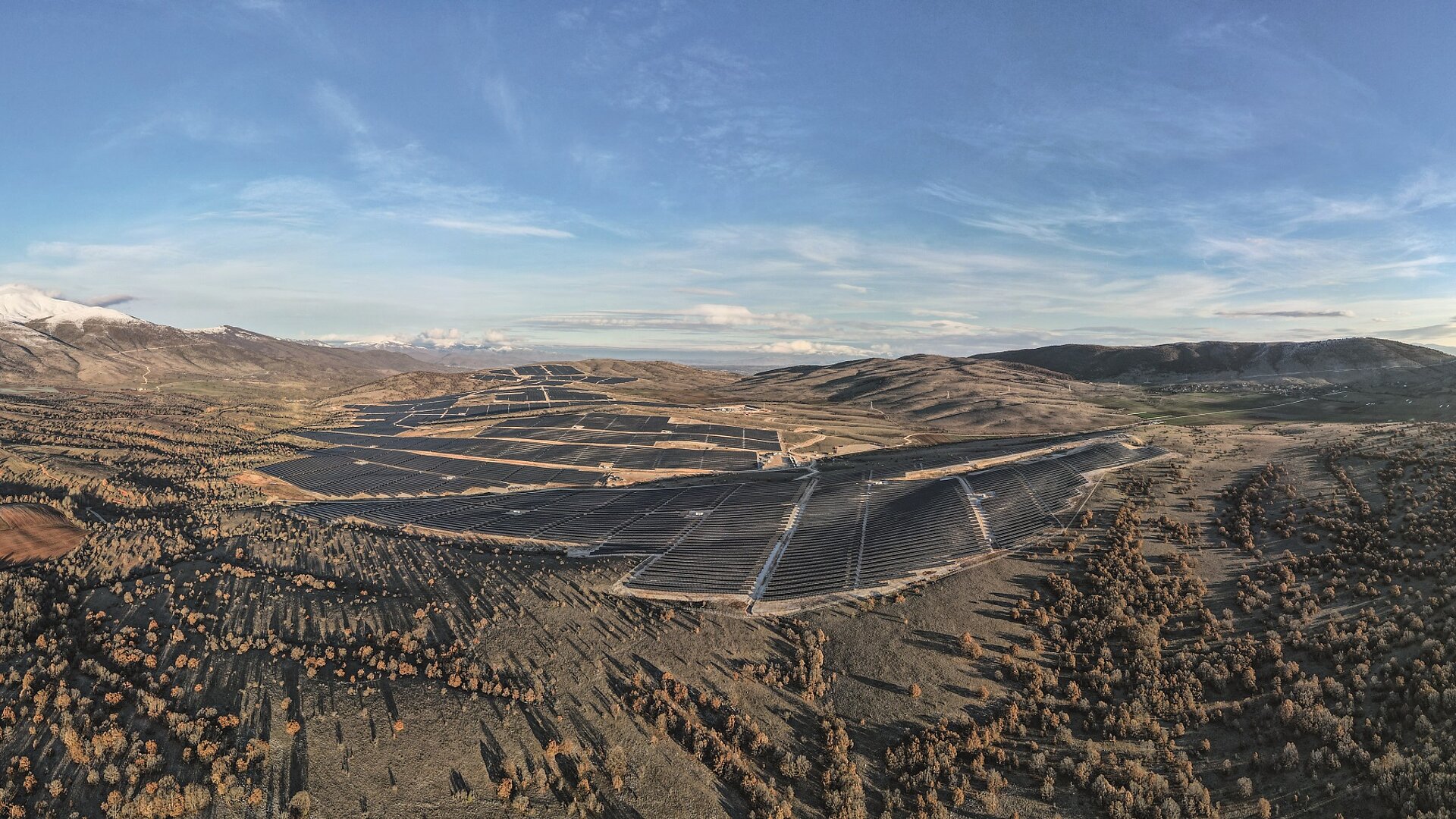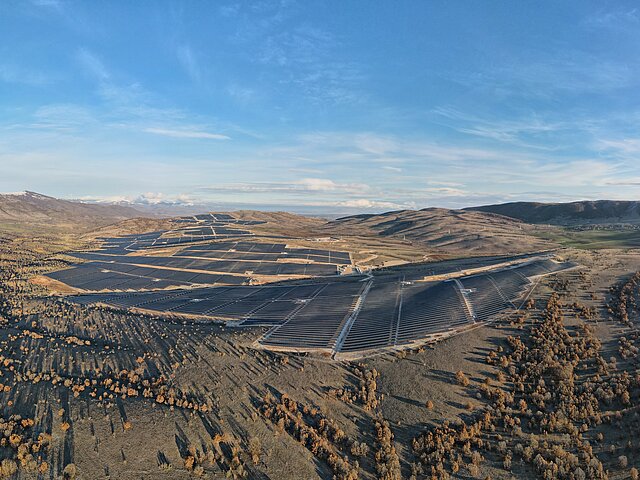
The miracle of Kozani
It´s a rugged, mountainous region in the north of Greece. Tourists rarely stray into this part of the country. Western Macedonia, and Kozani in particular, is known primarily for its coal deposits and saffron cultivation. The expensive spice is cultivated in the lower regions and exported from here all over the world. Further up in the mountains, which are over 2,000 meters high, the landscape is rather barren. The vegetation is just enough to provide a modest existence for some shepherds and their animals as pasture land. Crop cultivation is impossible up here. And yet, in the meantime, a resource is being harvested: Solar power for more than 75,000 Greek households.
Greece wants to phase out of coal by 2028 and significantly accelerate the expansion of renewable energies. The fact that the absolute showcase project for this has now been realised in Western Macedonia is quite symbolic. Until now, the region has stood for coal mining and coal-fired power generation.
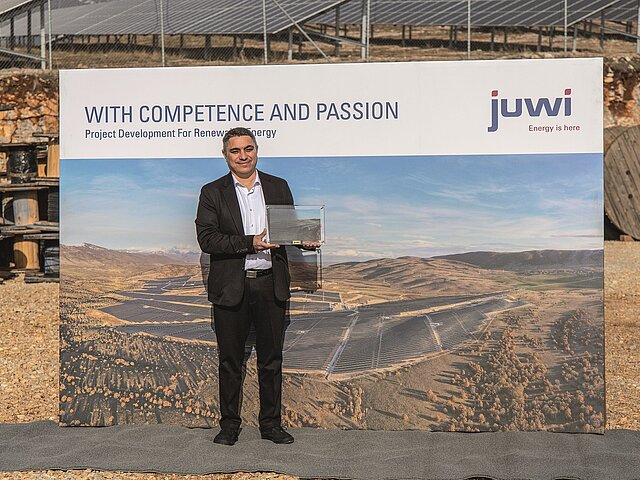
Economic crisis stops solar expansion
The idea of building a huge solar park has existed for a long time, since 2010, when Prime Minister Giorgos Papandreou announced the 200-megawatt Helios park to export solar power on a large scale to Central Europe. However, a lot of unexpected events happened: Greece came to the brink of insolvency in 2013 and suffered a severe economic crisis. The plans of the Greek state to expand solar power were put on hold for many years.
"It was simply forbidden to plan new solar parks," reports Takis Sarris, the managing director of JUWI Hellas. Sarris has worked for the company since 2008 and witnessed the hopeful development of the solar industry in Greece as well as its abrupt decline. After the collapse, companies and investors withdrew from the market. JUWI was among the few foreign companies that did not give up. With a small team, the operation of existing parks and a few new projects in neighbouring Turkey, the subsidiary kept its head above water. Despite all adversities: JUWI believed in the Greek market.
However, even for Takis Sarris it borders on a miracle that in his home country, after this long dry spell, the largest project in company history was now realised. It was a stroke of luck that brought him into contact with local project developer Vangelis Zagorakis in 2017 and got the ball rolling. Zagorakis, in fact, had planned a solar park about 15 kilometers from the provincial capital of Kozani that was exactly the scale that then-Prime Minister Papandreou had talked about. During the economic crisis, Zagorakis kept the project alive. However he lacked the funds to actually implement a 200-megawatt project and was, therefore, looking for a buyer.
At the time, JUWI had just decided to resume its project development activities in Greece and had successfully brought a first smaller project, the five-megawatt Mesokomo solar farm near Thessaloniki, through the tender process. A 200-megawatt park, however, is a completely different thing. Takis Sarris remembers his first talks with the management in Germany very well: "First of all, please listen to what I am about to tell you with an open mind," he began. As unusual as the request from the former five-man office in Greece was, the Greek managing director had good arguments. At some point it was clear: "We can't pass up this opportunity, even if it won't be a walk in the park." JUWI bought the project rights.
The next big obstacle was the tender on 15th April 2019: A 30-minute online auction decided the weal and woe of the project. Takis Sarris remembers it very well: for weeks he and the bidding specialists at the German headquarters had worked out a bidding strategy, countless computers had been set up in the Athens office of JUWI Hellas. And then they succeeded in what everyone had dreamed of: all 18 sub-projects were awarded a contract. JUWI secured almost 50 percent of the total tender volume. "Not only did we manage to get our entire project volume through the auction, we also received the highest tariff of all the solar projects that were awarded bids," reports the CEO. JUWI secured a tariff of just over 5.7 cents per kilowatt hour of green electricity produced for the Kozani solar park. This success finally cleared the way for the project. Investors from all over the world were suddenly lining up.
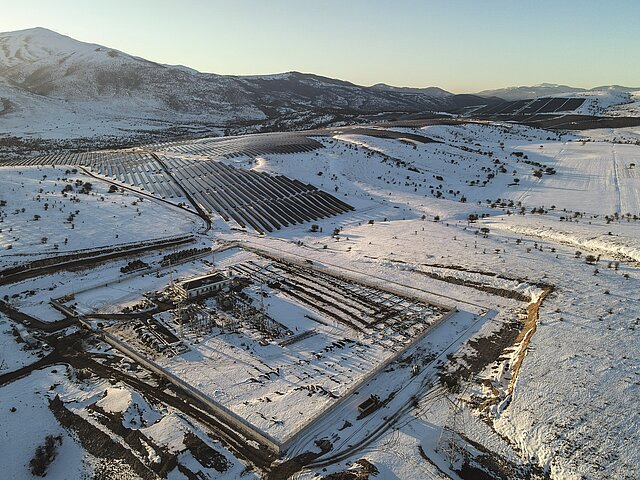
Solar park gets government leaders involved
The fact that the project was topic again, even at the top level of government, is probably also related to the investor decision that JUWI made. At the beginning of 2020, the newly elected Greek Prime Minister Kyriakos Mitsotakis visited Chancellor Angela Merkel in Berlin and announced, among other things, the following news: thanks to a German-Greek joint project in his country, a huge solar park was to be built in the north of Greece. After exactly nine months of negotiations, the Greek energy company Hellenic Petroleum, HELPE for short, had signed the purchase agreement in February 2020, and Mitsotakis was able to announce the good news during his visit to Germany. According to the plan, the first kilowatt hours of solar power were to flow in just two years.
However, the ambitious schedule was shaken up just a few weeks later. The ink on the contracts had barely dried when the corona pandemic hit the world. Strict lockdowns were declared, authorities were operating only in emergency mode, supply chains were disrupted, and economic and social life was massively disrupted. The world was fighting the pandemic, and the start of construction planned for October became a distant prospect. Official permits still had to be obtained for some of the 18 subprojects of the Kozani solar park - and the offices in Greece were simply out of reach.
Flexibility was now required: "In May 2020, we approached HELPE and suggested that, in contrast to what had been contractually agreed, we would start construction on the first individual projects before the permits for all projects had been obtained. This meant that we had to pre-finance the construction for longer, but we were able to keep to the schedule for the most part," Sarris recalls. In November 2020, construction actually began. Heavy equipment was used to prepare the first areas for the solar park. Initially, according to the plan, a 14-megawatt subproject was to be realised, which would serve as a blueprint for all further construction phases. Such an approach is also common in other projects, but there was one major difference: in this case, the sample section alone was larger than the largest solar farm ever previously built by JUWI in Greece.
It took until mid-February 2021 to complete the first 14-megawatt sub-project. "It was very important to us to follow the right concept and coordinate this first construction phase very carefully with the investor," Sarris reports. The approach was to pay off. While the first 14 megawatts took four months to complete, the project then proceeded at more than five times the previous speed. The construction team achieved the feat of installing all 500,000 modules by the end of 2021. The average construction speed was 19 megawatts per month.
Few people can really imagine the enormous planning effort behind such record times: at peak times 450 construction workers were active on the site. The supply of materials to the mountainous region had to be organised in such a way that it could keep pace with the construction speed. The Greek JUWI team grew from just under ten to over 50 employees within a few months. Additonally, international JUWI experts who had already realised projects of similar dimensions in other countries, supported the project.
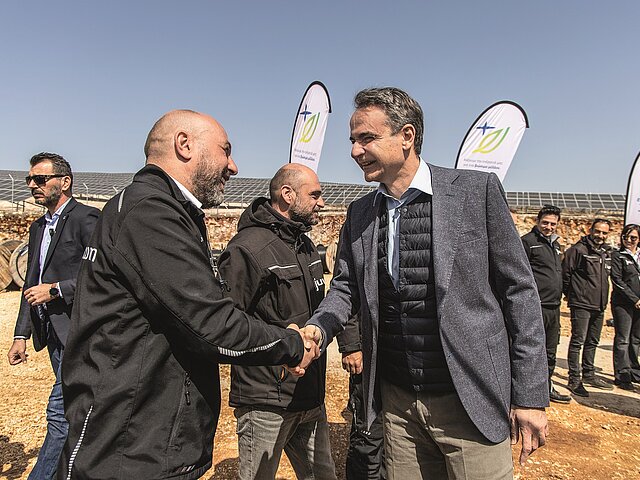
Forest fires, excavations and the onset of winter
All the wheels meshed perfectly. However, there are things that simply cannot be planned. The extremely dry summer of 2021 with temperatures of over 40 degrees overran many regions of Greece with severe forest fires. There were also extensive fires in western Macedonia. Although the solar park itself was not in threat, some of the surrounding villages were. In this situation, the schedule no longer mattered; it was a matter of saving people and their homes. So the construction site team used its heavy construction machinery to cut protective paths. The rescue operation succeeded, and the villages were spared from the fires.
At a point when only the two large transformer stations had to be built in the winter of 2021/2022, first archaeological finds and then the weather intervened. It is important to know that archaeological monitoring is mandatory for virtually every construction project in Greece. Additionally, the mountainous region was considered to be a prehistorically interesting area. During the last construction phase, of all things, the archaeologists actually came across such interesting finds from the Copper and Bronze Ages that the work had to be interrupted for several weeks. Half of a village was uncovered. The finds from different time periods impressively showed how houses and streets were repeatedly built on top of each other in the same place in different epochs, foundation on foundation. In the meantime, a separate room has been dedicated to these finds in the local museum and JUWI employees visiting the town have free admission.
After the archaeological work was completed, the weather then once again showed its extreme side. Temperatures of up to minus 30 degrees and constant snowfalls with snow heights of up to two meters made progress impossible. Several attempts to clear the access road to the solar park were thwarted by new snowfalls. The extreme snow and cold period lasted almost two weeks, then finally the final construction of the two huge high-voltage transformer stations could begin.
A few months later, this is one of the many stories that the project has presented us with. The solar farm is now feeding power into the grid, and early data suggests that the yield may yet exceed expectations. Six JUWI employees now take care of solar the park operations, and construction manager Dimitris Karapatsidis is one of them as the O&M person in charge of the park. No one knows the solar park in as much detail as he does. The region will also benefit from the new solar park in the long term: the surrounding communities will receive 500,000 euros annually. This will be used to finance environmental projects, and people in neighboring communities will receive subsidies for their electricity bills. These subsidies are so high that the residents will not only not have to spend any more money on electricity over the next 20 years, they can even build up savings In the future, module cleaning and mowing work will be carried out by auxiliary workers from the region. For the shepherds and their cattle, paths, stables and pastures have long since been built, and the solar park has brought a lot of good to the region in many other ways as well - not least attracting attention far beyond the state borders.
When Prime Minister Kyriakos Mitsotakis officially inaugurated the solar park on 6th April 2022, in front of 150 invited guests and numerous construction workers, there was a huge media response. All of a sudden Kozani no longer stands for coal-fired power but for solar power. In his exeptance of thanks, Mitsotakis himself referred to his visit to Berlin a good two years ago. He called it a miracle that this project could be completed in record time despite all adversities and the corona pandemic. The people who made this miracle possible were present. They enjoyed the moment.
You can watch a video of the construction here
